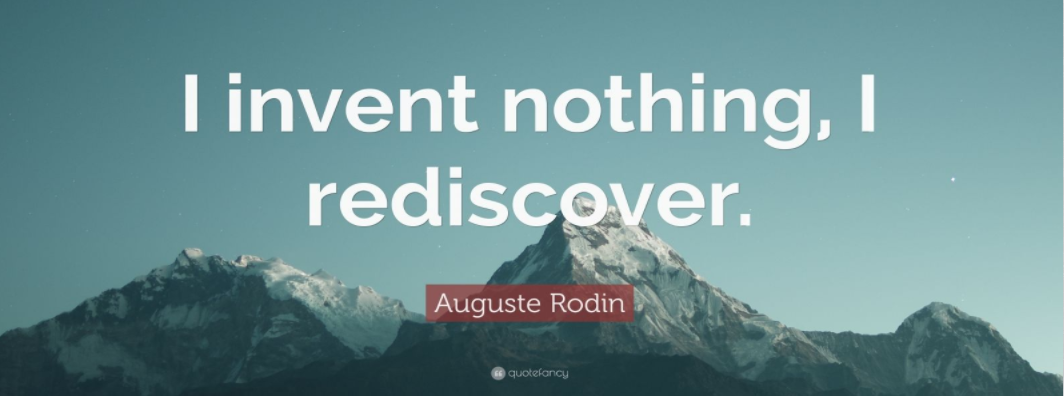The Approach
For me the act of writing is a discovery process. Auguste Rodin said, “I invent nothing, I rediscover.” I am a big proponent of the Multiverse Theory and it’s infinite possibilities. As far as I am concerned each story world is it’s own reality. I’m a visitor looking around and taking notes. My characters are largely independent of me. They have the ability to surprise and infuriate me, just like all the people in my life. When I am not thinking/writing about them, they go on with their lives regardless of my attention. Even in world building mode when I am trying to construct systems of government and politico dynamics, et al, I still have this sense that, like Michaelangelo, the shape of the thing I’m trying to create is already present in the mass/mess, but I have to put in the work to reveal what has been there all along.
The Method
Generally speaking when I start a story I have two things to work with. A character and the ending. I usually know how a story will end but I have absolutely no idea how I will get there. I am a panster by nature. Whether or not you choose to outline, here’s the thing, a lot can happen between bullet points. You may have a list of well thought out plot points but how you move characters from one plot point to the next is still a crap shoot. There are a lot of choices to make for every scene and how you transition from one scene to next. Anyone of those choices can render the rest of your plot points totally moot and you have to rethink what happens next. Again, this is my writing style. Some authors wield an iron fist over their creations and have absolute control at all times, if that is you, must be nice.
The other element I have to work with is a person. Characters are the most important part of a story to me. Clever ideas are good but very few people will stick with you solely because of a cool premise. When I start there I usually have an image in my head and there is at least one person at the center. I have no idea who they are or what they want, but they’re there waiting for me to find out. I used to just start writing, using that one image in my head as the starting point for my exploration. Lately I’ve been intentional about figuring out who the character is first. The internet is full of tools for character building. The one that has really helped me story wise is K.M. Weiland’s book, “Creating Character Arcs.” The time I put into going through her questions and developing my main cast before I start writing has really helped me to understand who these people are. As a bonus I get all kinds of awesome plot ideas. Because the plot is largely determined by the characters, if I have no idea who they are or what they want then I have no story.
The Hard Part
Writing. Panster or plotter it makes no difference, writers write. Full stop. The internet is rife with memes about procrastinating writers because it is true. Why do so many of us avoid that which we long to do? Ask ten writers and you’ll get ten answers. Whatever the reasons, you will have to wrestle yourself into submission on that one. But there will come a time when there is nothing left to do but put words to a page.
Soapbox Tangent
It has always annoyed the crap out of me when people casually declare they will write a book someday. I think because they are literate and know how to construct a sentence they assume a book should be any easy thing to do. Well, it’s not. If it was easy there would not be thousands of how-to books on the subject.
Okay, now that I have that off my chest…. Whatever you have to do to get those words down, do it. Habit is your friend. Our brains love routine and patterns so if you can write at the same time everyday (week/month/year) it will help creativity to flow a lot better. I trick myself by saying I only have to write 500 words. That’s it. As an example, the first two sections of this entry are about that. BUT, once I get rolling, I don’t usually want to stop. It’s the getting started part I find hard.
I have to schedule my time. I make appointments with myself and do not change them for anyone. There will be a million opportunities to interrupt you so schedule time when you can be the least demanded upon. If you are so popular/busy that this is impossible then you are going to have to choose writing time over social time. If you are serious about writing you will find a way. One of my writing partners is a mother of two little kids. She writes when they nap. Sometimes she can’t because of other things she has to do, but when she can write, she does. Progress is still progress no matter how slow.
In Conclusion
This is my method. You need to find your own path but it’s always nice to know how other people go about it. Other strong suggestions are: read (fiction and nonfiction, in all sorts of genres,) talk to other writers, and find other writing to workshop your work. It’s scary letting other people see your work in a raw state but you will learn a lot and improve by leaps and bounds if you can take to heart their suggestions.

 RSS Feed
RSS Feed